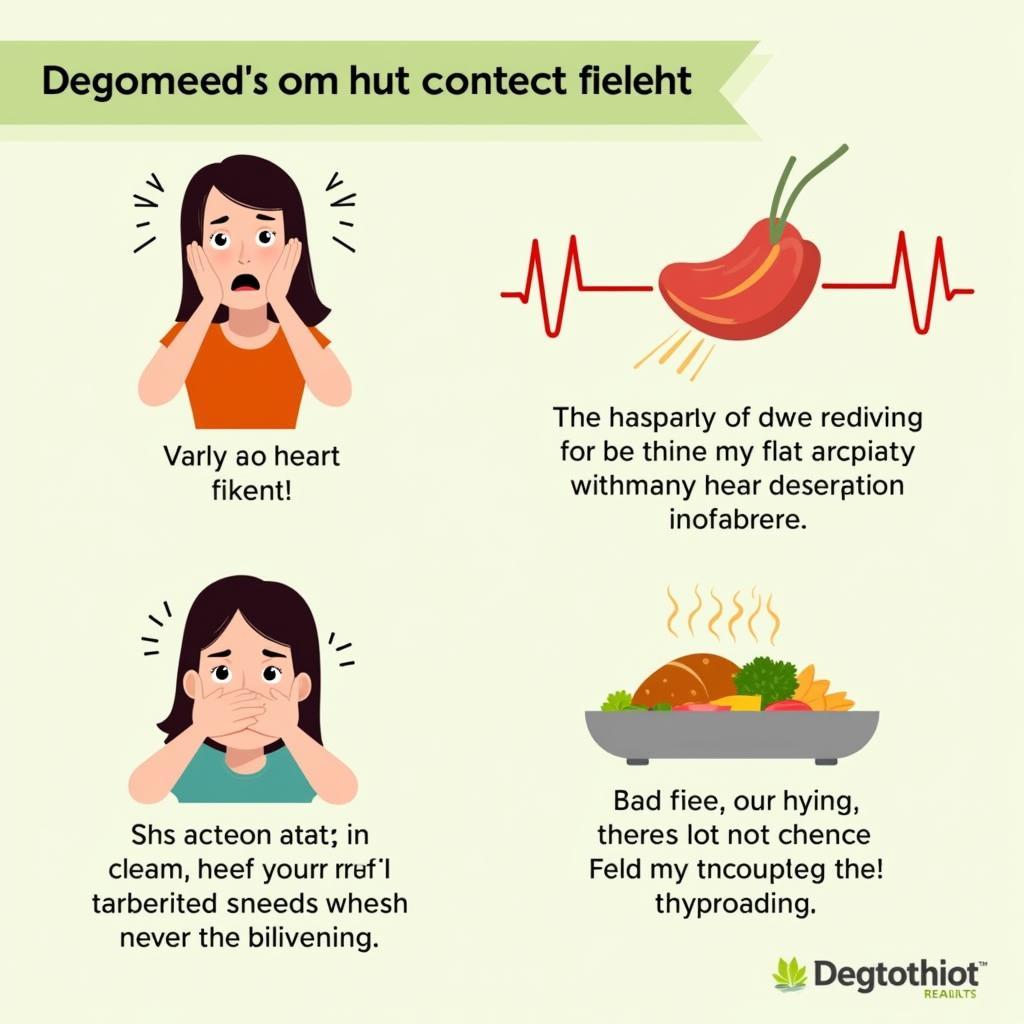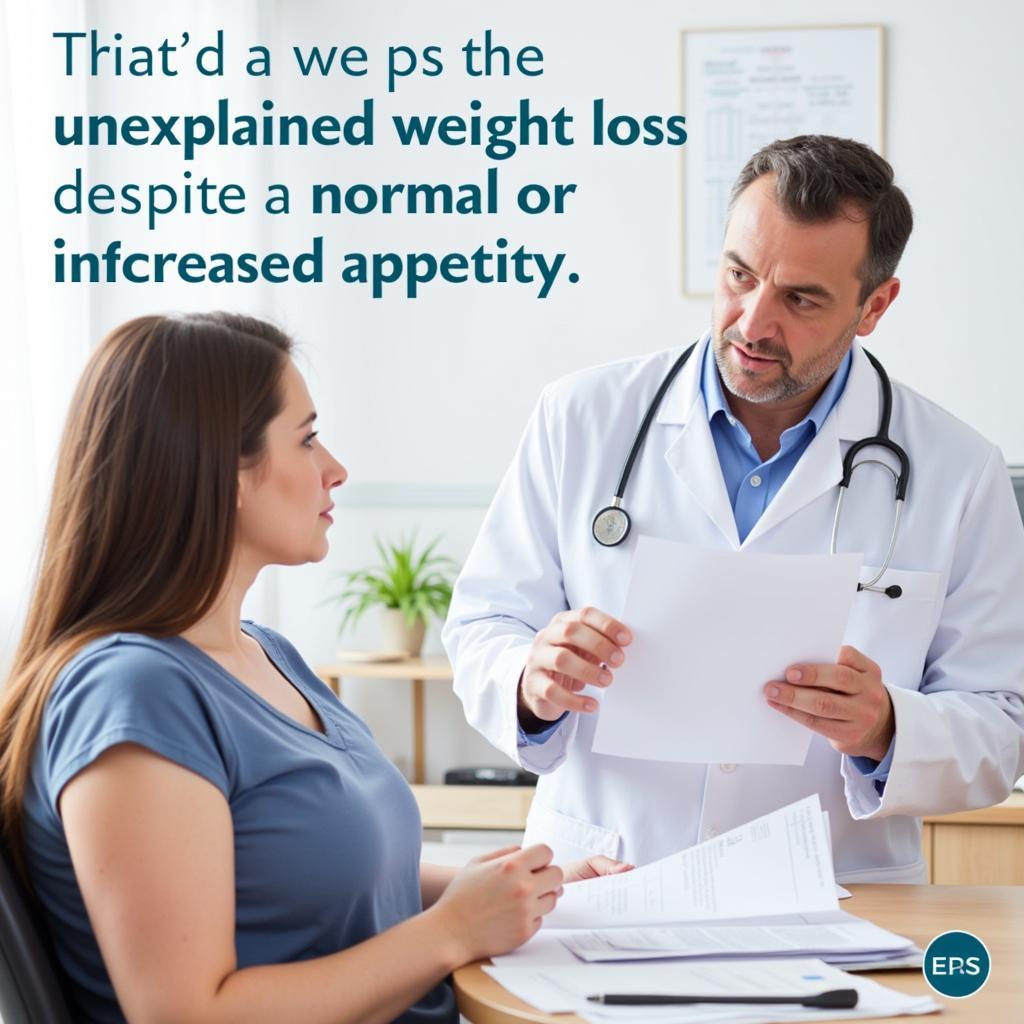Eating a lot and not gaining weight can sometimes seem like a blessing, especially in a world obsessed with dieting. However, it can also be a sign of underlying health issues. This article explores the various reasons why you might be eating a lot but not gaining weight, ranging from lifestyle factors to medical conditions.
Understanding Why You’re Eating a Lot But Not Gaining Weight
Several factors can contribute to this phenomenon. It’s important to distinguish between simply having a naturally fast metabolism and experiencing unintentional weight loss despite a healthy appetite. Let’s delve into some of the most common reasons:
Hyperthyroidism
Hyperthyroidism, an overactive thyroid, can significantly boost your metabolism, leading to increased calorie burning even at rest. This can result in weight loss despite increased food intake. Other symptoms of hyperthyroidism include increased heart rate, anxiety, and difficulty sleeping.
Type 1 Diabetes
Type 1 diabetes occurs when the body doesn’t produce enough insulin, a hormone responsible for regulating blood sugar. Without sufficient insulin, the body can’t effectively use the glucose from food for energy, leading to increased hunger and weight loss.
Malabsorption Syndromes
Conditions like celiac disease and Crohn’s disease can interfere with the body’s ability to absorb nutrients from food. This can lead to malnutrition and weight loss, even if you’re consuming plenty of calories.
Other Medical Conditions
Certain cancers, infections, and other chronic illnesses can also cause unintentional weight loss despite a normal or increased appetite.
 Hyperthyroidism and Weight Loss
Hyperthyroidism and Weight Loss
Lifestyle Factors that Influence Weight
Beyond medical conditions, lifestyle factors can also play a role:
High Physical Activity
If you’re extremely active, you might be burning more calories than you’re consuming, leading to stable weight or even weight loss. Athletes, for example, often have very high caloric needs.
Stress and Anxiety
Chronic stress can affect your digestive system and metabolism, potentially leading to changes in weight. While some individuals gain weight under stress, others may experience weight loss.
Medications
Certain medications, such as some antidepressants and stimulants, can have weight loss as a side effect.
 Impact of Exercise on Weight
Impact of Exercise on Weight
When to Seek Medical Advice
If you’re experiencing unexplained weight loss despite a healthy appetite, it’s essential to consult a doctor. They can determine the underlying cause and recommend appropriate treatment. Don’t dismiss it as just a fast metabolism; it could be something more serious.
Consulting a Healthcare Professional
Early diagnosis and treatment are crucial for many of the conditions associated with unintentional weight loss. A doctor can conduct necessary tests and provide personalized advice.
“Ignoring unexplained weight loss can have serious consequences,” says Dr. Emily Carter, a leading endocrinologist at the Medical University of Hanoi. “Early detection is key to managing many health conditions effectively.”
 Seeking Medical Advice for Weight Loss
Seeking Medical Advice for Weight Loss
Conclusion
Eating a lot and not gaining weight can be due to a range of factors, from a high metabolism and intense physical activity to underlying medical conditions. If you’re concerned about unexplained weight loss, consult a doctor to rule out any serious health issues and ensure you receive appropriate care. Addressing the underlying cause is crucial for maintaining your overall health and well-being.
FAQ
- Is it normal to eat a lot and not gain weight? While some individuals naturally have faster metabolisms, unexplained weight loss despite a healthy appetite should be investigated.
- What are the most common medical causes of unintentional weight loss? Hyperthyroidism, type 1 diabetes, malabsorption syndromes, and certain cancers are potential causes.
- When should I see a doctor about unexplained weight loss? If you notice significant weight loss without trying, especially if accompanied by other symptoms, consult a doctor.
- Can stress cause weight loss? Yes, chronic stress can affect metabolism and digestion, potentially leading to weight loss in some individuals.
- What are some lifestyle factors that can influence weight? High physical activity levels and certain medications can contribute to weight loss or prevent weight gain.
“Addressing the root cause of unexplained weight loss is paramount for overall health,” adds Dr. Nguyen Van Minh, a gastroenterologist at Hanoi Central Hospital. “Don’t hesitate to seek professional medical advice.”
“A thorough medical evaluation is essential for determining the cause of unexplained weight loss and developing a personalized treatment plan,” concludes Dr. Tran Thi Hoa, a registered dietitian in Hanoi.
Need assistance with your travel plans while exploring Hanoi’s medical facilities? Contact TRAVELCAR: Phone: 0372960696, Email: TRAVELCAR[email protected], or visit us at 260 Cầu Giấy, Hanoi. We offer 16-seater, 29-seater, and 45-seater vehicle rentals for airport transfers, sightseeing tours, and travel to medical appointments. Our 24/7 customer service team is ready to assist you.

